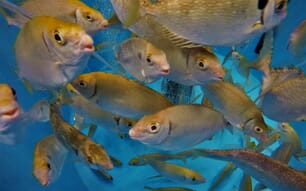
The northern abalone, prized as a gourmet delicacy, is already noted as an endangered species. Fisheries for the abalone were closed in British Columbia in 1990 to try to help conserve the species. However poaching has destroyed conservation efforts.
Funded by the Natural Sciences and Engineering Research Council of Canada, the study was an attempt to understand the impacts of climate change on endangered species. To conduct the study, northern abalone larvae were exposed to water containing increased levels of CO2.
The findings showed that by increasing CO2 levels from 400 to 1,800 parts per million, 40 per cent of larvae were killed, the size of larvae that did survive were decreased and an increase was seen in the rate of shell abnormalities (Figure 1).
Christopher Harley, Associate Professor with the Department of Zoology and one of the authors of the study stated that this is not only a devestating impact for populations of abalone, but also for the prospects of aquaculture and coastal economics.
Mr Harley added: "Because the species is already thought to be limited by reproductive output and recruitment, these effects are likely to scale up to the population level, creating greater limits on population growth."
Ryan Crim, lead author on the paper who conducted the research while a graduate student with the UBC Department of Zoology said, "While we’re looking at a single species that is culturally important as a source of food and artistic inspiration for many coastal Pacific Northwest First Nations, this information may have implications for other abalone species in other parts of the world."
The findings were published in the latest issue of the Journal of Experimental Marine Biology and Ecology.
Mr Harley and Mr Crim will continue to work with the aquaculture industry to study the effects of acidification on oysters and other shellfish.




